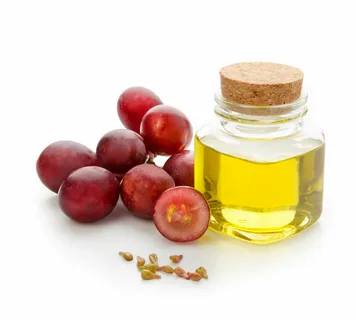Introduction
Grapeseed oil has gained popularity in recent years as a cooking oil due to its mild flavor, high smoke point, and potential health benefits. Extracted from the seeds of grapes, grapeseed oil is rich in polyunsaturated fats, antioxidants, and vitamins, making it a versatile option for culinary applications. In this comprehensive guide, we will explore the nutritional profile of grapeseed oil, its potential health benefits, best uses in cooking, how to store it properly, and answer frequently asked questions about its suitability as a healthy cooking oil.
Understanding Grapeseed Oil
Grapeseed oil is obtained by pressing the seeds of grapes, typically after the grapes have been used for winemaking. The oil has a light, neutral flavor and a pale green color, making it suitable for various culinary uses. Grapeseed oil is composed primarily of polyunsaturated fats, with a high concentration of omega-6 fatty acids, along with smaller amounts of monounsaturated and saturated fats.
Nutritional Profile of Grapeseed Oil
Grapeseed oil contains a range of nutrients and compounds that contribute to its health benefits
Polyunsaturated Fats
Grapeseed oil is rich in polyunsaturated fats, particularly linoleic acid, an omega-6 fatty acid that supports heart health and inflammation management.
Vitamin E
Grapeseed oil is a good source of vitamin E, a powerful antioxidant that helps protect cells from damage caused by free radicals and supports skin health.
Phytosterols
Grapeseed oil contains phytosterols, plant compounds that may help lower cholesterol levels and reduce the risk of heart disease.
Antioxidants
Grapeseed oil contains antioxidant compounds such as proanthocyanidins and flavonoids, which help neutralize free radicals and reduce oxidative stress in the body.
Health Benefits of Grapeseed Oil
Heart Health
The high concentration of polyunsaturated fats in grapeseed oil may help lower LDL (bad) cholesterol levels and reduce the risk of heart disease when used as part of a balanced diet.
Skin Health
The antioxidant properties of grapeseed oil, particularly vitamin E, can help protect the skin from damage caused by UV radiation, pollution, and other environmental factors.
Inflammation Management
Omega-6 fatty acids like linoleic acid in grapeseed oil may help reduce inflammation in the body, potentially benefiting conditions such as arthritis and inflammatory bowel disease.
Weight Management
Grapeseed oil is low in saturated fat and calories, making it a lighter option compared to oils higher in saturated fats. When used in moderation, it can support weight management goals.
Best Uses of Grapeseed Oil in Cooking
Grapeseed oil’s mild flavor and high smoke point make it suitable for various cooking methods:
Sautéing and Stir-Frying
Grapeseed oil’s high smoke point (around 420°F or 216°C) makes it ideal for sautéing and stir-frying at high temperatures without burning or smoking.
Baking
Grapeseed oil can be used in baking recipes that call for oil, such as cakes, muffins, and quick breads, providing moisture and a light texture to baked goods.
Salad Dressings
Grapeseed oil’s neutral flavor makes it a versatile base for homemade salad dressings, allowing other ingredients like vinegar, citrus, and herbs to shine.
Marinades and Dips
Grapeseed oil can be used as a base for marinades and dipping sauces, adding flavor and helping to tenderize meats and vegetables.
Homemade Mayonnaise
Grapeseed oil can be used to make homemade mayonnaise, providing a lighter texture and neutral flavor compared to other oils.
Proper Storage of Grapeseed Oil
To maintain the quality and freshness of grapeseed oil, follow these storage tips:
Cool, Dark Place
Store grapeseed oil in a cool, dark place away from heat sources and direct sunlight, as exposure to light and heat can cause the oil to degrade and become rancid.
Tightly Sealed Container
Keep the bottle of grapeseed oil tightly sealed when not in use to prevent oxidation and the absorption of odors from other foods in the pantry.
Refrigeration (Optional)
While not necessary, storing grapeseed oil in the refrigerator can extend its shelf life, particularly in warmer climates or if you don’t use it frequently.
Frequently Asked Questions (FAQs)
Is grapeseed oil healthier than other cooking oils?
Grapeseed oil offers health benefits due to its high content of polyunsaturated fats, vitamin E, and antioxidants. However, the healthiest oil for you depends on your dietary preferences, cooking methods, and overall diet quality.
Can I use grapeseed oil for deep-frying?
Grapeseed oil has a high smoke point, making it suitable for deep-frying at high temperatures. However, it’s important to monitor the temperature closely and avoid overheating the oil to prevent it from smoking or becoming rancid.
Is grapeseed oil suitable for people with nut allergies?
Grapeseed oil is derived from grape seeds and is generally considered safe for people with nut allergies. However, individuals with severe allergies should consult with a healthcare professional before using grapeseed oil or any new food product.
Can I use grapeseed oil for skincare?
Grapeseed oil’s antioxidant and moisturizing properties make it a popular ingredient in skincare products such as lotions, creams, and serums. It can be applied directly to the skin as a natural moisturizer or used in DIY skincare recipes.
Does grapeseed oil have a strong flavor?
Grapeseed oil has a mild, neutral flavor, making it versatile for cooking and baking without overpowering other ingredients. It’s an excellent choice for dishes where you want the flavors of other ingredients to shine.
Can grapeseed oil go bad?
Like all cooking oils, grapeseed oil can go rancid over time if not stored properly or used within its shelf life. Signs of rancidity include a foul odor, off-flavor, and cloudy appearance. Discard any grapeseed oil that shows signs of spoilage.
Conclusion
Grapeseed oil offers a range of health benefits and culinary uses, making it a versatile and nutritious choice for cooking and baking. With its high smoke point, mild flavor, and nutrient-rich profile, grapeseed oil can be incorporated into a variety of recipes to enhance flavor and promote overall health. By understanding its nutritional benefits, proper storage methods, and best uses in cooking, you can enjoy the versatility and health benefits of grapeseed oil as part of a balanced diet and lifestyle.
- How To Get Rid Of Bruising After Lip Filler - May 5, 2025
- Gaunt Face And Cheeks Treatment Near Fetcham, Surrey - May 5, 2025
- How Long To Wait For Lip Filler Top Up - May 4, 2025

